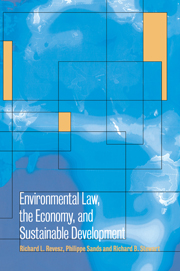 Environmental Law, the Economy and Sustainable Development
Environmental Law, the Economy and Sustainable Development Book contents
- Frontmatter
- Contents
- List of contributors
- Introduction: environmental regulation in multi-jurisdictional regimes
- PART I ENVIRONMENTAL REGULATION IN FEDERAL SYSTEMS
- 1 Federalism and environmental regulation: an overview
- 2 Economic criteria for applying the subsidiarity principle in European environmental law
- 3 The political economy of pollution control in a federal system
- PART II ENVIRONMENTAL REGULATION AND INTERNATIONAL TRADE
- PART III CHOICE OF ENVIRONMENTAL POLICY INSTRUMENTS
- PART IV THE ENVIRONMENTAL STANDARD - SETTING PROCESS
- PART V INTERNATIONAL ENVIRONMENTAL LAW AND SUSTAINABLE DEVELOPMENT
- Index
1 - Federalism and environmental regulation: an overview
Published online by Cambridge University Press: 03 May 2010
- Frontmatter
- Contents
- List of contributors
- Introduction: environmental regulation in multi-jurisdictional regimes
- PART I ENVIRONMENTAL REGULATION IN FEDERAL SYSTEMS
- 1 Federalism and environmental regulation: an overview
- 2 Economic criteria for applying the subsidiarity principle in European environmental law
- 3 The political economy of pollution control in a federal system
- PART II ENVIRONMENTAL REGULATION AND INTERNATIONAL TRADE
- PART III CHOICE OF ENVIRONMENTAL POLICY INSTRUMENTS
- PART IV THE ENVIRONMENTAL STANDARD - SETTING PROCESS
- PART V INTERNATIONAL ENVIRONMENTAL LAW AND SUSTAINABLE DEVELOPMENT
- Index
Summary
In the United States, vesting control over environmental regulation at the federal level is most commonly justified both in the legal academic literature and the legislative arena by reference to three distinct arguments. First, advocates of federal control argue that in its absence interstate competition would result in a “race to the bottom.” Second, they maintain that federal regulation is necessary to prevent interstate externalities. Third, proponents of centralization raise the public choice claim that environmental interests will be systematically underrepresented at the state level relative to business interests.
This essay, which builds upon my prior works in the area, has three major purposes. First, it casts serious doubt on the validity of some of the arguments made in favor of centralizing environmental regulation. Second, it shows that, to a large extent, there has been a misallocation of responsibility over environmental regulation: the federal government has taken too aggressive a role with respect to matters best handled at the state level, but has been too constrained in its exercise of authority with respect to issues over which it enjoys a distinct comparative advantage. Third, it attempts to extract from the experience in the United States, lessons that might be of interest to the European Union and to the international trading regime.
The first section develops the arguments for a presumption for decentralization, which calls for vesting responsibility over environmental protection at the state rather than federal level, as a result of differences in preferences over environmental protection, as well as differences in the benefits and costs of such protection.
- Type
- Chapter
- Information
- Environmental Law, the Economy and Sustainable DevelopmentThe United States, the European Union and the International Community, pp. 37 - 79Publisher: Cambridge University PressPrint publication year: 2000
- 10
- Cited by


